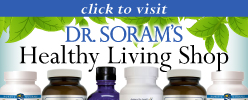
In fact, most of your body’s cells are constantly being replaced, although its DNA stays the same from the moment the cell is first created (by its parent cell dividing).
Because of this, Jonas Frisen, a stem cell biologist at the Karolinska Institute in Stockholm, was able to develop a method to determine just how old your cells really are.


 Athlete’s foot is one of the most common skin infections around, and usually attacks your feet in the dark, damp areas between your toes. Fungus, of course, love moist environments of all kinds, including showers, swimming pools and locker rooms, the latter being why this infection got the name “athlete’s foot.”
Athlete’s foot is one of the most common skin infections around, and usually attacks your feet in the dark, damp areas between your toes. Fungus, of course, love moist environments of all kinds, including showers, swimming pools and locker rooms, the latter being why this infection got the name “athlete’s foot.”.aspx?width=165&height=250) Women who live in heavy traffic areas such as the Northern Manhattan and South Bronx areas of New York City, could give birth to children with an increased risk of asthma due to what are called toxic PAH’s (Polycyclic Aromatic Hydrocarbons).
Women who live in heavy traffic areas such as the Northern Manhattan and South Bronx areas of New York City, could give birth to children with an increased risk of asthma due to what are called toxic PAH’s (Polycyclic Aromatic Hydrocarbons)..aspx?width=167&height=250) “Disease cannot live in a body that’s in a healthy emotional state,” at least, so says author Bob Proctor in the film, “The Secret.” “The Secret” — which was not being shown in theaters, but rather was spread through a viral, grassroots marketing campaign — discussed a centuries-old principle that has earned a “new-age” reputation.
“Disease cannot live in a body that’s in a healthy emotional state,” at least, so says author Bob Proctor in the film, “The Secret.” “The Secret” — which was not being shown in theaters, but rather was spread through a viral, grassroots marketing campaign — discussed a centuries-old principle that has earned a “new-age” reputation. Inflammation is your body’s natural response to outside invaders it perceives as threats. Specifically, it’s a process in which your body’s white blood cells protect you from foreign substances such as bacteria and viruses.
Inflammation is your body’s natural response to outside invaders it perceives as threats. Specifically, it’s a process in which your body’s white blood cells protect you from foreign substances such as bacteria and viruses.

.aspx?width=167&height=250) It’s somewhat instinctive to warm-up before a workout. You may jog in place a little, shake out your arms, do a few stretches, and some other movements to get your heart pumping and your body feeling loose before you exercise. After you’re done exercising, however, you may be tired, and taking the time to cool down and support your body post-workout may be the last thing on your mind.
It’s somewhat instinctive to warm-up before a workout. You may jog in place a little, shake out your arms, do a few stretches, and some other movements to get your heart pumping and your body feeling loose before you exercise. After you’re done exercising, however, you may be tired, and taking the time to cool down and support your body post-workout may be the last thing on your mind. This article may very well be the “most important article you read this year”… for your better health. You may even want to print out relevant sections and or simply pass it along in its entirety to friends and loved-ones. It covers a lot of health related information we hope you find helpful.
This article may very well be the “most important article you read this year”… for your better health. You may even want to print out relevant sections and or simply pass it along in its entirety to friends and loved-ones. It covers a lot of health related information we hope you find helpful. Although single men may tout the joys of living the carefree “bachelor’s life,” it turns out married men may have an advantage. Numerous studies have proven that married life is good for men, physically, mentally and spiritually as well as women.
Although single men may tout the joys of living the carefree “bachelor’s life,” it turns out married men may have an advantage. Numerous studies have proven that married life is good for men, physically, mentally and spiritually as well as women. Empathy is the ability to put yourself into someone else’s shoes — to understand them, to feel their pain, to take on their concerns, worries and regrets, as well as their joys, their elations and their excitement. As basic and elemental as this may sound, it’s not an easy thing to do. But it is beneficial.
Empathy is the ability to put yourself into someone else’s shoes — to understand them, to feel their pain, to take on their concerns, worries and regrets, as well as their joys, their elations and their excitement. As basic and elemental as this may sound, it’s not an easy thing to do. But it is beneficial.


